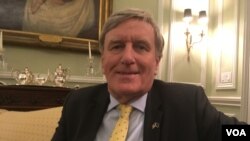As the Oct. 31 Brexit deadline approaches, Ireland's ambassador to the United States is expressing a degree of optimism that a creative solution may be found, but he insists there has to be a legally binding agreement "that there can never be a hard border on the island of Ireland."
The so-called "backstop" negotiated between former British Prime Minister Theresa May and the European Union "is a guarantee that there can never be a hard border on the island of Ireland," Ambassador Daniel Mulhall said in an interview with VOA.
"It is not enough for us to be told that 'we promise you, there will not be a problem,'" he said. "There has to be a legally binding agreement, and that's where I think we have to work hard over the next six weeks between the United Kingdom and the European Union to find a solution to this problem, because nobody wants to see Britain crash out of the European Union."
NAFTA example
Mulhall cited the process of the renegotiation of a trade agreement between the U.S., Canada and Mexico as an example of how things could work out.
"When the U.S. wanted to replace NAFTA, they had negotiated a successor agreement. Until that agreement, the USMCA, comes into force, NAFTA remains in force, so as to provide for a framework for trade between the U.S., Mexico and Canada — and the same should be done between the UK and the EU," Mulhall said.
What Ireland wants, Mulhall added, "is to maintain the open border on the island of Ireland and to preserve the precious peace process that has saved so many lives over the last 21 years." He noted that peace process was achieved "with huge support" from both the executive and legislative branches of the U.S. government over a long period of time.
Mulhall described the withdrawal agreement negotiated by May and the EU as meeting that objective. "If there is to be an alternative set of arrangements, those arrangements would have to achieve the same outcome; if they [Britain] have ideas that can achieve the same outcome, it would be good for us to hear them," he said.
Mulhall said, "There are those who think that maybe a solution could be to have a backstop for Northern Ireland only, but that's something that doesn't seem to be popular with the British government." Such a plan was rejected early in the Brexit negotiations by May's Northern Irish coalition partners, who feared it would threaten their role as part of Britain.
'Unique place'
Mulhall pointed out that Northern Ireland "is a unique place, because it's got a land border with the rest of Ireland, therefore a land border with the European Union."
The question of how to prevent that land border from becoming a hard border with customs and other controls that would threaten the peace on the island constitutes "the whole crux of this negotiation," he said.




